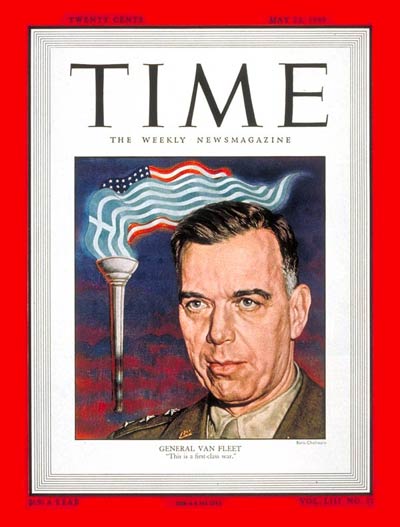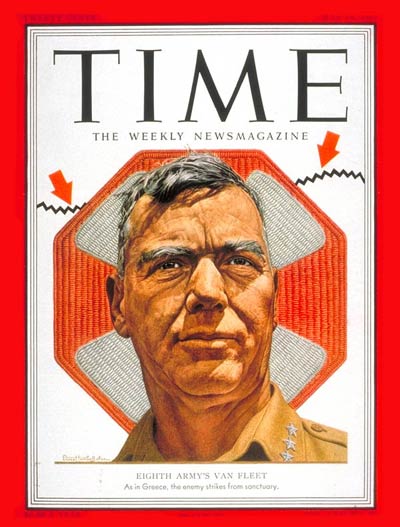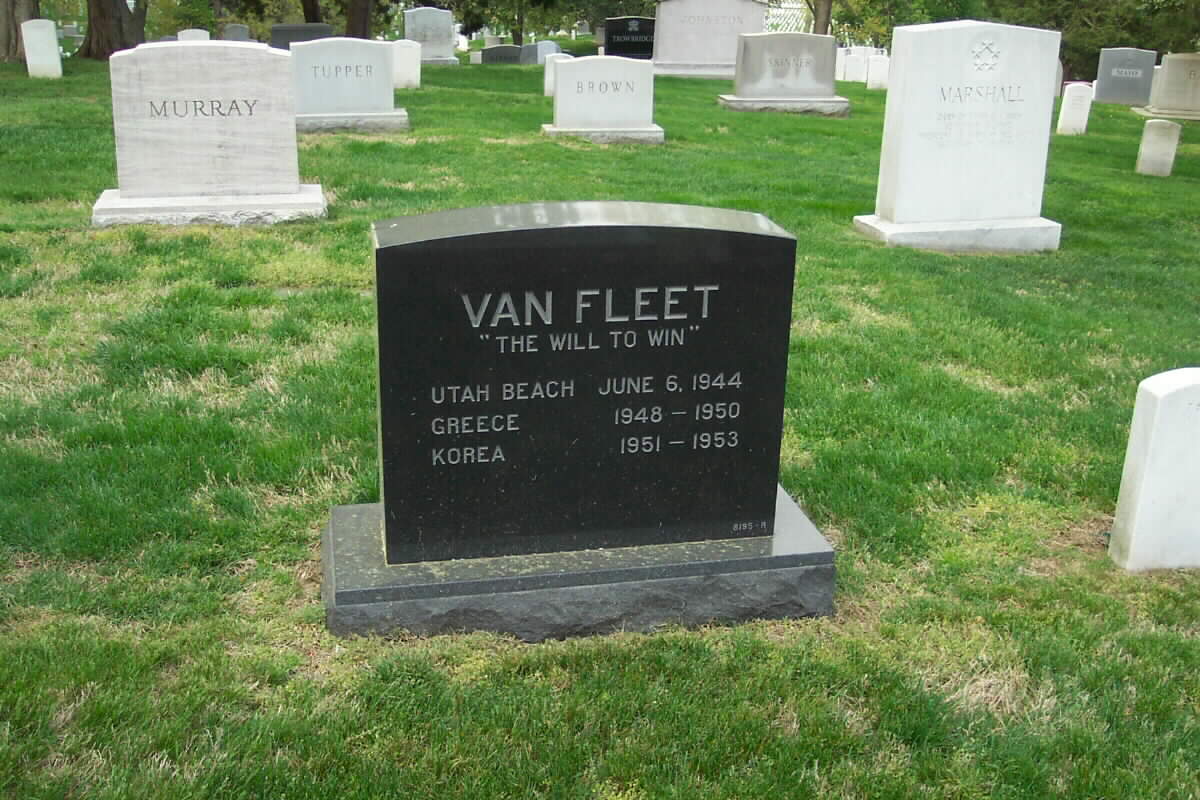James Alward Van Fleet, a foot soldier through nearly four decades in the United States Army and a commander who led major campaigns in WWII and the Korean War, died Wednesday, September 23, 1992 at his ranch in Polk City, Florida. He was 100 years old and died in his sleep, funeral home officials said.
His career stretched from serving as newly commissioned Second Lieutenant chasing Pancho Villa with The Old Guard to General commanding the 8th US Army and the U.N. forces in Korea 38 years later, died in sleep September 23, 1992, and was buried at Arlington National Cemetery Wednesday, September 29, 1992.
Van Fleet was born in Coytesville, New Jersey, March 19, 1892, but raised in Florida and adopted it as his home. He led US troops under John J. “Black Jack” Pershing during the Mexican Revolution against Francisco “Panco” Villa. He commanded 17th Machine Gun Battalion in France during WWI and in WWII moved up in command from regiment to Division and Corps while fighting against the Germans. He led U.S. and U.N. forces during the Korean War. President Truman called him America’s “greatest general.”
His ancestry can be traced back to the Revolutionary War, where his grandfather, Joshua Jan Van Fleet, joined New York Militia in 1779. The elder Van Fleet went on to become a New York legislator and state judge, before retiring to serve as a Colonel in the state militia. His father and mother, William and Mendora Van Fleet, owned property in Chicago and were friends of Abraham Lincoln. William Van Fleet subsequently served in Union Army during Civil War. William is credited with being instrumental in establishing the first railroad in Florida. He was proud to have had his son nominated in 1911 to West Point, after he graduated from Summerlin Institute in Bartow, Florida.
In the class of 1915, he had as his classmates Dwight Eisenhower and Omar N. Bradley, with whom he would serve in Europe in WWII. Standing more than 6 feet tall and possessed with what was described as “an easy grace,” Cadet Van Fleet played fullback on Army’s undefeated football team in his senior year. He graduated 92nd in his class, and was commissioned an Infantry Second Lieutenant.
His first active-duty assignment was to Eagle Pass, Texas, from where he accompanied Pershing and his 3rd Infantry Regiment in their pursuit of Villa. In his time with “The Old Guard” he was promoted to First Lieutenant, then to Captain as a company commander.
As the U.S. entered WWI, he went to France with the 6th Division in July 1918 and assumed command of the 17th Machine Gun Battalion. He was wounded in action on November 4, 1918 near Sedan, France, but not before he had been decorated twice for bravery with Silver Stars. At the end of the war, he remained on occupation duty with his battalion until June 1919, when he was assigned to the 6th Division at Camp Grant, Illinois.
He held several ROTC assignments between the world wars. He was first assigned to the ROTC at Kansas State Agricultural College then to South Dakota State College. From 1921 to 1924 he was coach of the University of Florida football team in addition to being in charge of ROTC program at the University. He would return to the University for the 1932-33 year in a similar capacity. He further honed his leadership skills as a battalion commander with the 42nd Infantry in the Panama Canal Zone, before returning to the U.S. to instruct at the Infantry School at Fort Benning, Georgia. While there he attended advanced course, graduating in June 1929.
When WWII began, he was commander of the 8th Infantry Regiment of the 4th Infantry Division, a unit he would train and lead on maneuvers and amphibious exercises in more than four states before leading them into battle on D-Day, June 6, 1944 – the Allied invasion of Europe. Colonel Van Fleet’s regiment spearheaded his Division’s landing on Utah Beach in France. Following the landings, Supreme Allied Commander General Eisenhower told Army Chief of Staff George C. Marshall that Van Fleet deserved credit for his leadership and successes on the battlefield. During the conversation it was revealed that although several commanders had recommended him for promotion, he had been passed over because of unfavorable information in his records. Marshall discovered that the unfavorable information really should have been attributed to another officer with a similar name, and he was soon appointed the assistant commander of the 2nd Infantry Division, wearing the stars of Brigadier General. In that capacity, and later as commander of 4th and 90th Infantry Divisions in George S. Patton’s 3rd Army, he could be found in the thick of the fighting as history was being made on the continent. His 90th Division spearheaded the attack on Metz and the crossing of the Moselle and Saar Rivers. He also led Patton’s relief of Bastogne during the Battle of the Bulge. By March 1945 he commanded his own Corps.
At the end of the war in Europe, Lieutenant General Van Fleet and his Corps were deployed back to the U.S. for shipment to the Pacific, but the war there ended while they were still at Camp Polk, Louisiana. He was returned to Europe in 1947. Within two months was transferred to the U.S. Army Group, part of the U.S. Mission for Aid to Greece. He became commander of the Joint US Military Advisory Group which provided operational advice to the Greek military in their battle with the Communist insurgents. After the Greek victory, he was returned to U.S. as commander of the Second Army at Fort Meade, Maryland, but his stay there was short.
On April 11, 1951, he was sent to Korea to command the 8th U.S. Army and U.N. forces, replacing Matthew B. Ridgeway, who himself was replacing Supreme Commander Douglas MacArthur. With the job came a fourth star. Under his leadership, U.N. troops drove North Koreans and Chinese north until he was ordered to stop his push northward as the communists had called for peace talks. His troops held for the next two years, as armistice negotiations were conducted. He is credited with establishing infantry, artillery and small-unit officer’s courses and retraining the forces in Korea. He also established the Korean military academy and sent some Korean officers to military course in U.S.
His only son, Captain James A. Van Fleet, Jr, also fought in the war as a Air Force B-26 pilot. During a night bombing mission in April 1952, the Captain was reported missing in action. His status was changed to presumed dead two years later.
The General retired from the Army on March 31, 1953, with the accolade from former President Harry Truman of being “the greatest general we have ever had. I sent him to Greece and he won the war. I sent him to Korea and he won the war.”
Eight years later in 1961, President John F. Kennedy called him to active duty to survey the National Guard and Special Service Forces units.
During his career, he earned more than twenty U.S. medals, including Distinguished Service Cross with two Oak Leaf Clusters, the Distinguished Service Medal with three Oak Leaf CLusters, the Silver Star with two Oak Leaf Clusters, the Bronze Star Medal with two Oak Leaf Clusters, and the Purple Heart with two Oak Leaf Clusters. He also was authorized to wear the Combat Infantryman’s Badge.
His last public appearance came in March 1992, during his 100th birthday celebration here. “Thank you very much; I hope I deserve some of it,” he said from a wheelchair in a barely audible voice.
He was buried on Wednesday, September 30, 1992. Survivors include two daughters, Helen McConnell and Dempsie McChristian; eight grandchildren; and twelve great-grand-children.
Also buried with him in Section 7 of Arlington National Cemetery are:
Helen Moore Van Fleet, his first wife. October 15, 1892-January 5, 1984.
James Alward Van Fleet, Jr., Captain United States Air Force. December 28, 1925-April 4, 1952. Lost in action over Korea while on bombing run with Far Eastern Air Force. “In memory of” on parent’s stone.
James Alward Van Fleet, Jr.
- Born at Auburndale, Florida, December 28, 1925
- Captain, US Air Force
- Missing in Action – Presumed Dead. Died March 31, 1954 in Korea.
- Captain Van Fleet was a member of the 13th Bomber Squadron, 3rd Bomber Wing. He was listed as Missing in Action while participating in aerial support over Korea on
- March 30, 1953 and presumed dead on March 31, 1954. Captain Van Fleet was awarded the Air Medal and the Purple Heart.
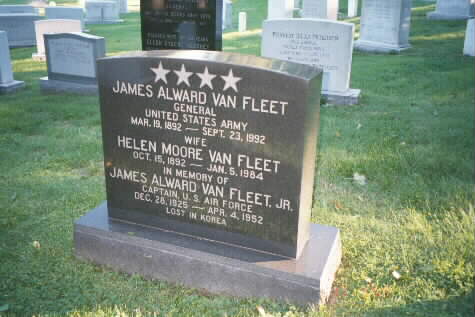
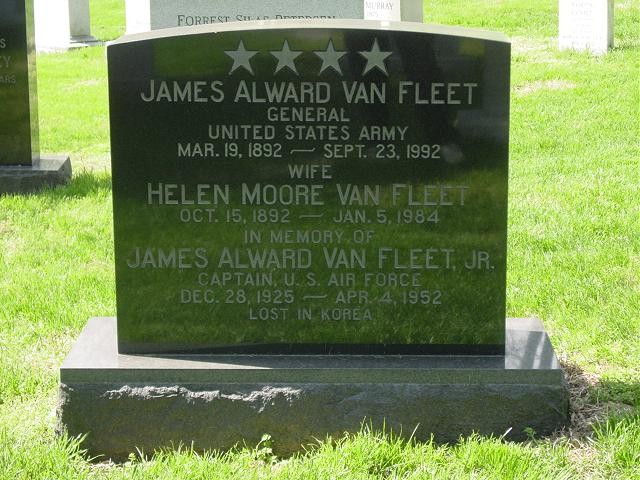
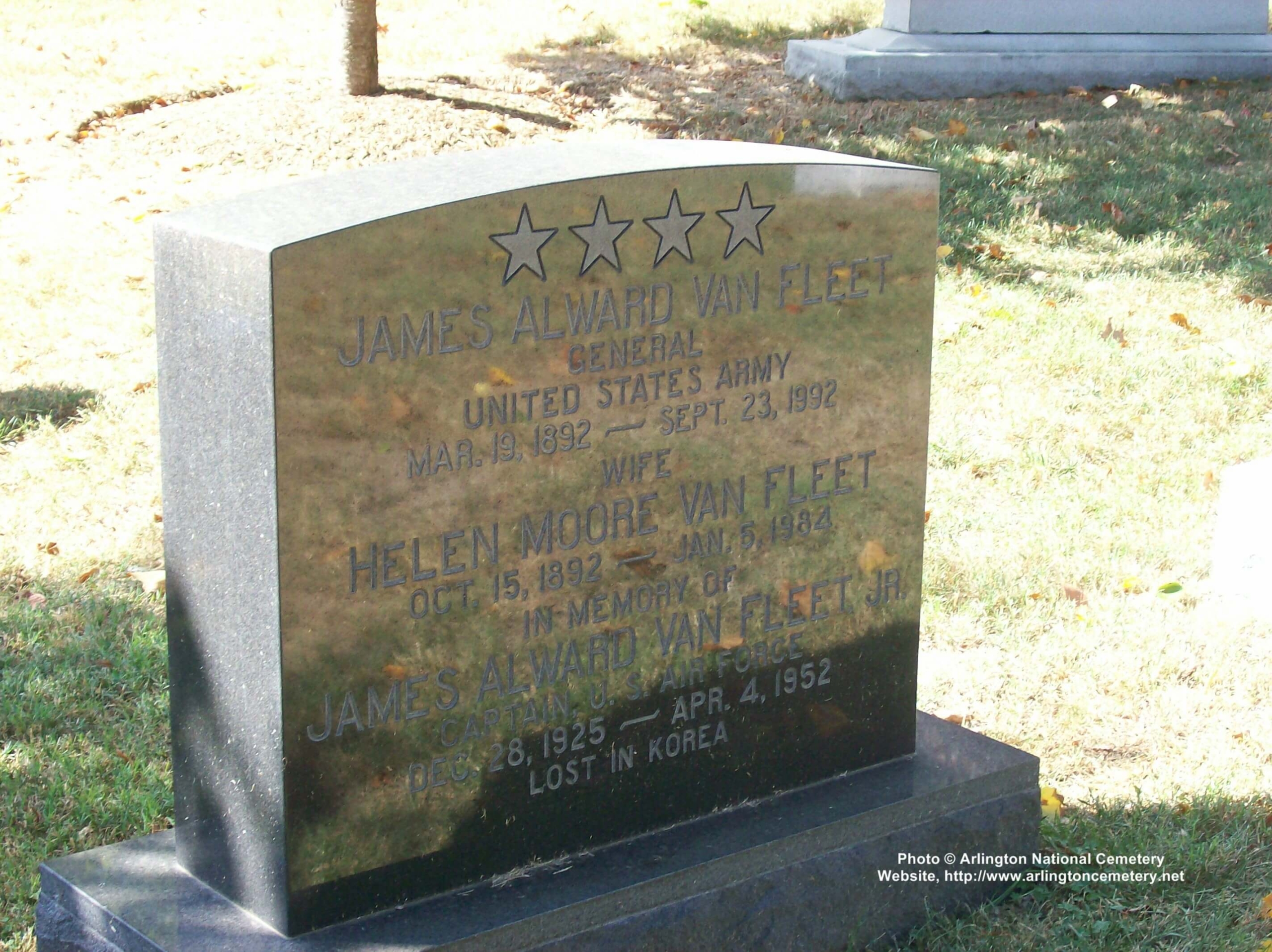
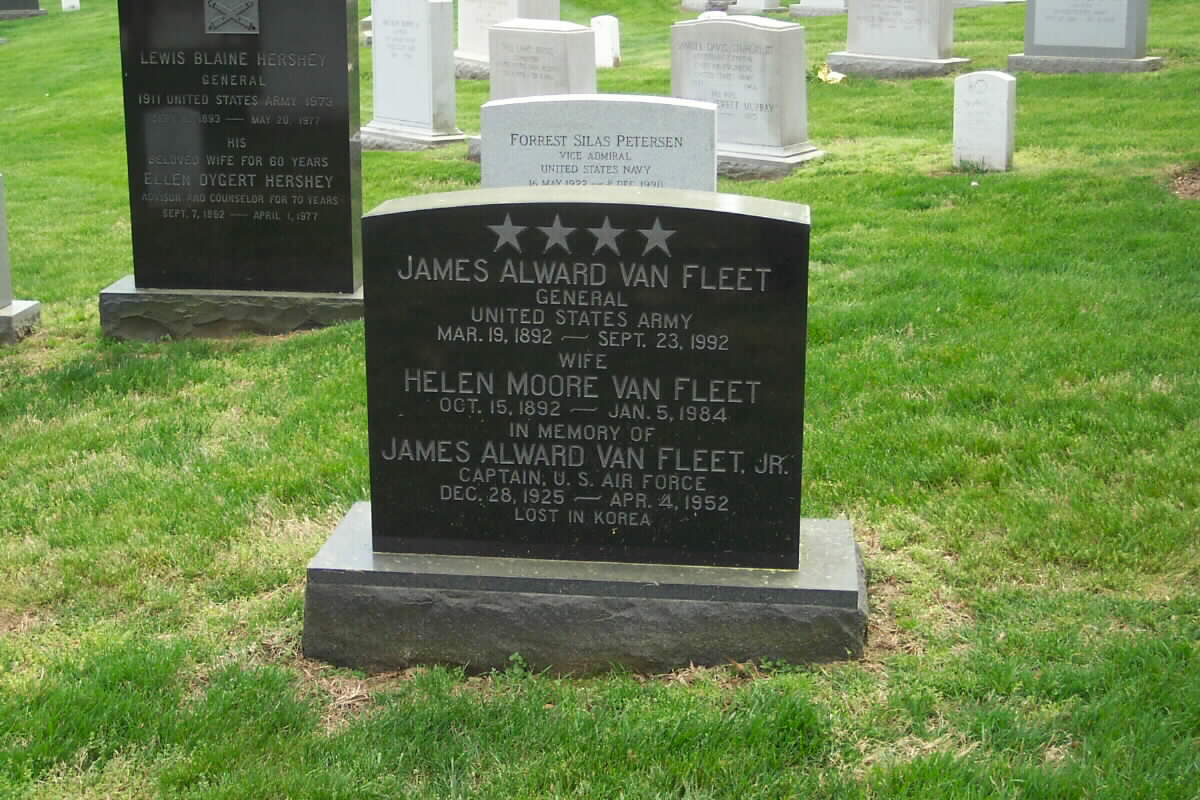
Michael Robert Patterson was born in Arlington and is the son of a former officer of the US Army. So it was no wonder that sooner or later his interests drew him to American history and especially to American military history. Many of his articles can be found on renowned portals like the New York Times, Washingtonpost or Wikipedia.
Reviewed by: Michael Howard

